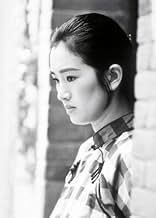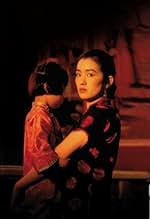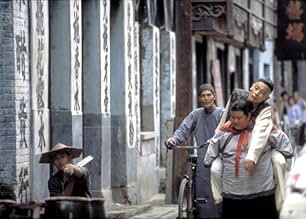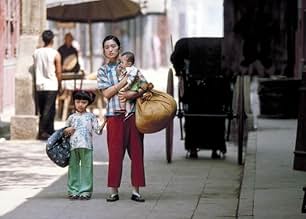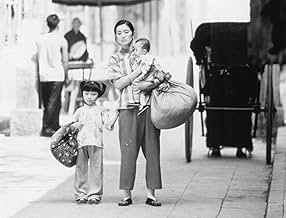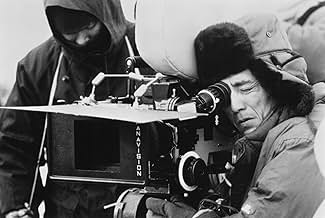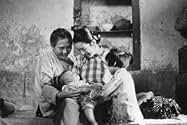Nachdem Fugui und Jiazhen ihr persönliches Vermögen verloren haben, gründen sie eine Familie und überleben schwierige kulturelle Veränderungen im China der 1940er bis 1970er Jahre.Nachdem Fugui und Jiazhen ihr persönliches Vermögen verloren haben, gründen sie eine Familie und überleben schwierige kulturelle Veränderungen im China der 1940er bis 1970er Jahre.Nachdem Fugui und Jiazhen ihr persönliches Vermögen verloren haben, gründen sie eine Familie und überleben schwierige kulturelle Veränderungen im China der 1940er bis 1970er Jahre.
- 1 BAFTA Award gewonnen
- 5 Gewinne & 6 Nominierungen insgesamt
Empfohlene Bewertungen
Both leading actors nicely portray the way their characters change over the years. At first, Fugui is the stereotypical "callow young man" and Jiazhen the even more stereotypical "long- suffering wife," but the screenplay and actors eventually deepen the characterizations.
The best sequence of the film covers the Chinese Civil War. Wisely, Yimou Zhang resists the temptation to make the movie too epic, and instead focuses on Fugui's personal experiences. The result is a very moving depiction of the human cost of war. In another striking touch, Fugui's hobby is singing with a shadow-puppet troupe. The puppets not only provide an interesting glimpse into traditional Chinese culture, they also take on a symbolic meaning.
After watching "To Live," it's easy to see why the Chinese authorities banned it: there's a lot of tragedy in the film, and in most cases, Communism is to blame. Remarkably, though, Zhang also makes many of the Communist characters sympathetic. For instance, Fugui and Jiazhen's daughter marries an officer in the Red Guards, who is a little ridiculous in his devotion to Mao Zedong, but not a villain. This is in keeping with the overall spirit of "To Live"--humanistic and subtle, instead of bombastic or propagandistic. It's both an important examination of recent Chinese history, and a universal story about how individual human beings manage "to live" in times of hardship. A rare combination, and one well worth seeing.
Lantern was precisely contained within narrative walls, it abstracted life by placing us in the midst of turning cycles of life and wove cloths out of that turning in the form of rituals that marked passage; color, sound, weather, architecture. It was akin to a Buddhist mandala to me, a cosmic picture directing me to find my own place in the center of things, choose repose over madness.
Zhang by contrast here wanders unconstrained, under the auspice of history, aiming for a full chronicle of sorts of Chinese life as a family moves through the decades. The stage backdrop changes frequently; Civil war, Great Leap, Cultural Revolution.
We do still have the turning of cycles and it does create a (cosmic) picture; a life of comfort squandered by the man's ignorance who loses it all, to one of hardship and quiet abiding. But eventually it doesn't direct towards a center that will illuminate the turn as something more than the ramblings of history.
And it's simply not a very enviable position to want to be the chronicler of history like Zhang is trying to here, it reminds me of how Kusturica stifled himself in similar endeavors. It means our reference point always has to be an externally agreed version of reality and we have to be chained to that sweep.
You can see him try to root himself in something more essential - the husband becomes a puppeteer putting on shadow plays for the people, life as the canvas where these evanescent shadow plays are enacted, now losing a fortune, now gaining back your family, so that we could see it from the distance of transient flickers of drama. Civil war is introduced as someone hacking down the screen, revealing war as another play that demands its actors assume their place.
But this is forgotten in lieu of stopping at various points of history so that it ends up being more the Oscar winning type than history parting to reveal myriad reflections like Andrei Rublev. Had it come out from the West, I'm sure it would have won a few and the wonderful Gong Li her first. The best I got out of it eventually was the sense of a man and woman trying to make their way together as the skies shift and the stage quakes by the ignorance of unseen puppet masters enacting their little plays. The Great Leap castigated as a wall collapsing on a little boy, because the man who crashed his car and the boy were both overworked and needed sleep.
Zhang took care to color history within certain lines so that we veer close to the monumental failures of the era but never quite see the full brunt of the horror, famine or mass persecution, only bits of abuse in passing. It was still banned by Party hacks anxious to control the play.
But this film is so beautiful and so real, that it's unbearably heartbreaking at times. Every time I watch it, and I know a particular heartbreaking scene is coming up, I almost want to turn it off, but I'm just frozen in place, forced to experience the pain of the people on screen, that I've traveled three decades with. Zhang's understanding of the people of China, and the tragedy of history is full of empathy, respect, and adoration. In every scene, Gong Li embodies strength and beauty. Zhang's study of communism and of the Chinese government, isn't a villifying one sided argument, but one with complete understanding of the tragedy of this huge social experiment, that effected not only China, but the whole world.
As a Korean American, I draw some appreciation at the parallel effects on Communism on Korea. Mao-Kim, Taiwan-SouthKorea. But this is a truly universal movie, and anyone would enjoy it.
It is easy to dismiss this movie as a "Sad period piece," but with another look, one sees that this is a story about triumph... of taking heart in the fact that one lives. The title, "To Live," is very apt, as we see the rises and falls of one small family living through the ups and downs of China during the pre-revolutionary era, the civil war, the Great Leap Forward, the Proletariat Cultural Revolution, and beyond.
This movie is at turns dramatic, humorous, touching, chilling, heart-wrenching, and triumphant. A true roller coaster of emotions, played out in the subtle tones only Chinese film can truly capture.
'Huozhe' or 'To Live' takes us on a trip in China that will last us from the 40's through the 70's. Through that time, we will see life through the eyes of Fugui and Jiazhen, a husband and wife with 2 children, as well as Fugui's mother.
Fugui, the husband, has a gambling problem which will set off a chain of events that will have them lose the house, and eventually separate the family. Jiazhen, his wife, is forced to take a job which will put a strain on her children. Communist and nationalist armies battle each other, and the rise of Chairman Mao will affect them as well. Fugui will go through layers of mishaps that will change him forever. I don't want to detail anything more about the plot, it's much more worth viewing it and experiencing it then anything I can ever say here.
Not once is this movie boring, effectively placing us there, with the family. The acting seems so natural that it feels like you are there, traveling with them, rather then viewing them through a camera. This of course shows the strength of Zhang's directing. You Ge plays Fugui, a popular actor in China, won the award for the Cannes Film Festival. Li Gong is beautiful, and portrays her character with such passion, it's no wonder she has been nominated nearly a dozen times, winning most.
Emotional without being sappy, honest, & historically accurate, the film does have a black shroud covering it. In times of sadness, it's lifted a bit to allow us to see happiness, indeed, life, pull this family together. It even has bits of humor in it, at times, I laughed along with the family as much as I felt their pain. Little details, such paintings in the background that chip away as time goes by, shows how much care went into making this film. Characters that seem unimportant become part of the story later.
What a wonderful film. When I saw it 10 years ago, it not only changed the way I saw foreign movies, it also changed the way I see life and people. Any movie that can do that is one I highly recommend to anyone.
A perfect 10 out of 10.
Wusstest du schon
- WissenswertesInitially, Director Zhang Yimou was forbidden from filmmaking for 5 years by the Chinese Communist Party as a result of making this film. However, due to outside pressure this was later withdrawn.
- Zitate
Little Bun: [playing with chickens] When will they grow up?
Xu Jiazhen: Very soon.
Little Bun: And then?
Xu Fugui: And then... the chickens will turn into geese... and the geese will turn into sheep... and the sheep will turn into oxen.
Little Bun: And after the oxen?
Xu Fugui: After oxen...
Xu Jiazhen: After oxen, Little Bun will grow up.
Little Bun: I want to ride on an ox's back.
Xu Jiazhen: You will ride on an ox's back.
Xu Fugui: Little Bun won't ride on an ox... he'll ride trains and planes... and life will get better and better.
Top-Auswahl
- How long is To Live?Powered by Alexa
Details
Box Office
- Bruttoertrag in den USA und Kanada
- 2.332.728 $
- Eröffnungswochenende in den USA und in Kanada
- 32.900 $
- 20. Nov. 1994
- Weltweiter Bruttoertrag
- 2.332.728 $
- Laufzeit
- 2 Std. 13 Min.(133 min)
- Farbe
- Sound-Mix
- Seitenverhältnis
- 1.85 : 1


